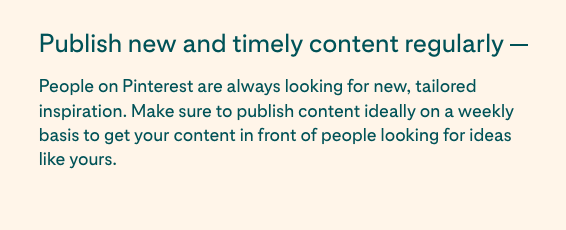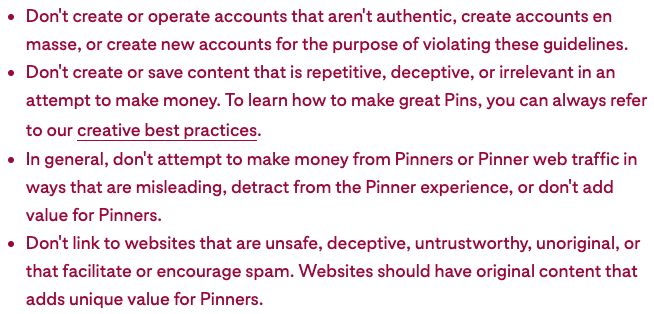You shouldn’t start Pinterest marketing until you’re blogging consistently. If that sounds weird coming from someone whose whole job is to market on Pinterest, it shouldn’t.
Because if you know anything about Pinterest, you know that the Pinterest algorithm loves fresh, original content. So much so that their community guidelines include the words “original,” “authentic,” and “unique” more than 10 times in total.
The easiest and best way to create that content is by blogging consistently.
Blogging isn’t just something that benefits your Pinterest marketing, though; it can also be a foundational pillar of your business’s content marketing strategy.
If you haven’t started a blog for your business yet or have fallen off the blogging bandwagon, my goal today is to convince you to make blogging your number one priority, particularly if you want to be on Pinterest. (Which, since you’re here, I have a pretty good feeling you do.)
Why Blogging and Pinterest Marketing Go Together
If you want to market your business on Pinterest, you need to be blogging. If you’re blogging, you need to be marketing on Pinterest.
These two marketing channels are the kind of BFFs every 10-year-old girl dreams of. They’re exchanging BFF friendship bracelets and making plans to go to the same college, work in the same city, and raise their kids next door to each other.
Basically, blogging and Pinterest go together like peanut butter and jelly — they just make sense.
The Pinterest algorithm used to be easy to “hack” by repinning the same old blog post over and over again. But in 2020, Pinterest cracked down on that and explicitly stated they would be prioritizing new original content from creators.
Don’t believe me? Check out these words straight from the horse’s mouth (aka, the Pinterest community guidelines):


>> “Don’t create or save content that is repetitive”
>> “Publish new and timely content regularly”
>> “Websites should have original content that adds unique value for Pinners”
Pinterest wants its creators to be creating new, original, and unique content. They straight up tell you exactly how to succeed on Pinterest!
Now, of course, Pinterest doesn’t specify that you have to use blogs as that content vehicle. But if you ask me, it’s the simplest way to create consistent content that also benefits your business as a whole.
Benefits of Blogging for Your Business
1. Each blog is another chance to get your website ranking in Google searches
You may think of a blog post as different than a page on your website, but it’s really the same thing. And every page you have on your website is another chance to show up in your target audience’s search results. Therefore, the more you blog, the more SEO opportunity you have.
Furthermore, Google prioritizes helpful content. While your website pages might be helpful, your blog posts almost definitely are, and it’s usually easier to get a blog post to rank than it is a regular website page like your home page or about page.
2. Publishing blogs consistently keeps your website up-to-date
Another thing Google cares about is how recent and up-to-date your website is. They only want to be giving their users the best, most accurate and recent content, so if you haven’t updated your website in 5 years, it might not be the best from an SEO perspective.
Writing blogs shows Google (and your audience) that you’re actively updating your website, which is important both for SEO and to convert readers from your blogs!
3. Blogs provide crucial information to potential customers along the path to purchase
Not every person who ends up on your website will be ready to inquire or buy right away. Sometimes people need more information and time to make that decision, even if you do have the best website copy in the world. That’s where your blog posts can come in.
Your blogs can prove your expertise and authority in your industry, answer frequently asked questions or objections potential customers might have, and give readers a better view of your personality. For service providers, often the decision to hire comes down to personality fit more than anything else, which more casual content like blogs can help show off!
4. Writing blogs helps you structure a content-repurposing workflow
My favorite blog writing expert, Natty of Natty Writes summarizes this idea as a “blog first, social second” approach to content marketing, and I couldn’t agree more.
When you start your content creation workflow by creating one long-form, hero piece of content — like a blog post — it’s much easier to repurpose that content into a variety of different formats. You can turn one long blog post into multiple Instagram posts, share it on your stories, turn it into Reels and TikToks, create dozens of pins that link back to it, share it in your newsletter, etc.
If you’re trying to reverse engineer that process, it tends to be a lot more difficult and clunkier.
Benefits of Blogging for Pinterest Creators
If those benefits alone haven’t convinced you to start blogging regularly for your business, here are even more reasons why blogs in particular are so beneficial if you want to start Pinterest marketing.
1. Blogs are more enticing for Pinterest users to click on
Unless your target audience on Pinterest is logging on specifically with the intent to purchase something, it’s unlikely they’ll be enticed to click through to your website just with a salesy or promotional pin.
Most Pinterest users are looking for inspiration and information. They want solutions to the problem they’re currently experiencing, often in the form of free education. Blogs are an excellent way to provide that.
2. The more you blog, the more URLs you have to pin on Pinterest
What makes a pin “unique” and “new” on Pinterest isn’t just about what you’re linking the pin to, but it is a big and important component. A fresh pin can be defined as any new-to-Pinterest pin, which includes new images pinned to links that have already been shared on Pinterest.
But there’s only so long you can get by with the same old set of URLs. Publishing new content on your blog not only satisfies the Google algorithm, but it makes the Pinterest algorithm happy, too. And with the ability to create dozens of pins from one single blog, blogging consistently creates an endless supply of Pinterest content for you.
3. Blogs are a powerful tool for conversion and sales
While a Pinterest user might not click “checkout” directly after clicking on a sales page, they might be convinced to download a freebie or check out your shop over the course of reading a blog post.
When a user clicks on your blog post pin, they aren’t limited to just the content of the blog. Now you’ve got them on your website, where you have plenty of opportunities to convert that blog reader into a subscriber, customer, or lead! And unlike a single pin on Pinterest, you can link to multiple different blogs or products within your blog posts. It turns your blog into a choose-your-own-adventure experience for the Pinterest user.
Do You Need a Blog to Market on Pinterest?
So what’s the real answer — do you need a blog to market on Pinterest? No, but you really should be blogging consistently if you want to use Pinterest to drive traffic and sales to your business. Blogging regularly will help you succeed and grow on Pinterest, not just “do it” for the sake of saying you’ve “done it.”
Want to learn more about blogging, Pinterest, and their whole merry bunch of marketing friends? Subscribe to the Thursday Press for your weekly edition of sustainable marketing and business growth advice!
